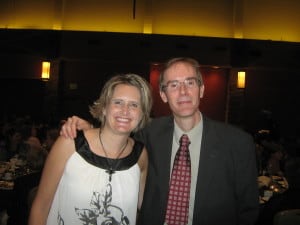
RI: Now one of the main sections of your book is the dreaded D-word:
Discipline. Why does a writer need discipline?
MD: Because you’ll never go anywhere in this business if you’re a
slacker. Writing is a profession. It takes time and effort and
diligence.
RI: Hmmmm, that might explain a few things… You mentioned the 10000
hour rule in your book. What’s that all about?
MD: Yes, here’s a link that describes it. It’s Malcolm
Gladwell’s idea (actually he found it from someone else) that true
genius comes from dedicating 10,000 hours to something. So if you
want to be a genius writer, you need to write 10,000 hours.
RI: I used to feel incredibly stupid when I admitted that it took me
about 5000 hours of writing time before I sold my first book. What
about you? How long did you take?
MD: I found that people loved my publishing story as long as I told
them about the last part of it. They didn’t want to hear about the
decade + amount of time it took me to find my voice.
RI: I spent about 10 years, at about 500 hours per year. That’s how I
did my 5000 hours. Ten years seems to be a fairly common number among
published authors. Although of course I know some who were quicker.
And some who took a lot longer.
MD: I wrote for over ten years in obscurity, miles and miles of
unpublished words. So many people want an instant formula, but there
isn’t one. Just BOC, butt on chair time. Yes, there are always
exceptions. It’s like the supermodel getting discovered in a diner.
That just doesn’t happen very often. Most models work behind the
scenes before their “break” comes.
RI: So is it just all about “butt in chair” time, or is there more than that?
MD: Well, you have to be willing to be read and critiqued.
RI: Are there ways to speed up the process a bit?
MD: The more you open yourself up to other writers further along the
journey than you, the faster you’ll grow as a writer. You have to
have thick skin, though, and be willing to weather rejection over and
over again.
RI: What about those of us who hate criticism?
MD: Then they shouldn’t write for publication. Sorry to be harsh, but
either you choose to develop thick skin or you’ll shrivel up under
scrutiny. The truth? You’re not the next Steinbeck. You do need to
improve. And your words should be edited.
RI: But I do hate criticism.
MD: So do I. But I’ve learned how to buck up. It’s not easy. And you
will still be hurt. The thing is: if you never try, you’ll never be
criticized.
RI: One thing I do is to tell my editors to point out some of the
good things I’m doing in my writing. They can tell me all the wrong
things, but I want to know which things not to edit.
MD: But if you try and get feedback, that’s actually a sign of
writerly growth. I also believe you’ll grow in your instincts the
more you write. You’ll know what is good, and what to throw out. And
when an editor gives you feedback you disagree with, you can
confidently say why you think it’s okay. That only comes after you’ve
found your voice.
RI: Editing is the one thing you never outgrow. I don’t know a single
writer who doesn’t need an editor. I’ve been writing 23 years and I
still hire freelance editors to critique my work.
MD: Yes, I do too. In this book, I hired a freelance editor. I can’t
see my own typos.

0 Comments